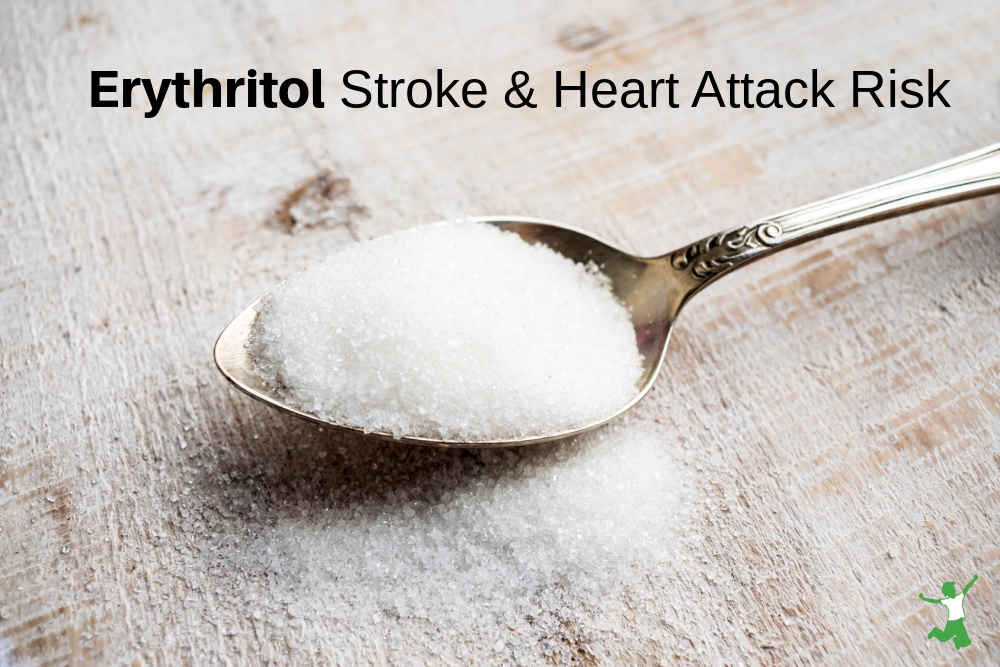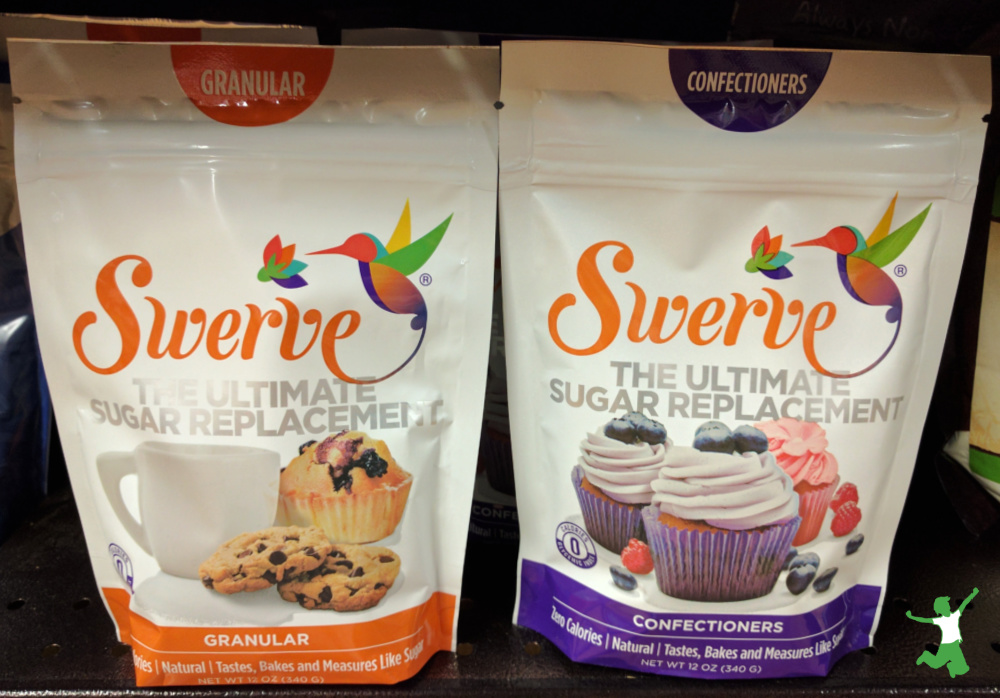Table of Contents[Hide][Show]
Using erythritol as an alternative sweetener is associated with increased risk for heart attacks and strokes according to a large, 4000+ person study by the Cleveland Clinic.

For almost 10 years, I have warned my readers to avoid erythritol found in a dizzying array of low-carb foods and alternative sweeteners like Swerve.
This low-calorie sweetener is very popular with those following the keto diet, Trim Healthy Mama or similar low-carb protocols to lose weight.
Erythritol is perhaps the most popular of the sugar alcohols, which contribute to gut imbalance among other potential harms to beneficial intestinal flora.
This nail in the coffin for erythritol once again demonstrates that there is no free lunch when you are trying to change your diet to get healthy.
Fake sweeteners like erythritol and chemical cousins like diarrhea-inducing xylitol just aren’t going to get you there over the long-term.
In other words, you can’t have your artificially sweetened flourless cake and eat it too.
You need to eat REAL FOOD for health…that includes whole sweeteners like raw honey or maple syrup if you wish to enjoy something sweet on occasion!
Let’s look at the details of this damning study on erythritol.
You would be well advised to go to your pantry and immediately toss anything in there that contains it!

Large Study with over 4000 Participants
The Cleveland Clinic conducted the study with the peer-reviewed journal Nature Medicine publishing the finding in February 2023. (1)
The study included more than 4,000 participants in America and Europe. (2)
The findings revealed that people with higher blood erythritol levels had a greater risk of suffering a heart attack, stroke, or even death.
They also examined the effects of adding erythritol to either whole blood or isolated platelets, which are cell fragments that clump together to stop bleeding and contribute to blood clots. Results revealed that erythritol made platelets easier to activate and form a clot. Pre-clinical studies confirmed ingestion of erythritol heightened clot formation [emphasis mine]. (3)
Correlation or Causation?
The large study on the negative health effects of blood level of erythritol shows an associated risk and is not double-blind causative research.
However, in the wise words of the Florida Surgeon General Dr. Joseph Ladapo,
Just because correlation does not equal causation does not mean we should abandon common sense!
Ignoring this research because the link is associative is very short-sighted.
Conclusions
Per the Cleveland Clinic, erythritol is about 70 percent as sweet as sugar.
However, when consumed, the intestinal tract has difficulty metabolizing the product.
This means that some ends up in the blood, where it doesn’t belong.
The Cleveland Clinic press release described the scenario as follows:
Instead, it [erythritol] goes into the bloodstream and leaves the body mainly through urine. The human body creates low amounts of erythritol naturally, so any additional consumption can accumulate.
Predictably, Calorie Control Council Executive Director Robert Rankin downplayed the study’s results as “contrary to decades of scientific research showing reduced-calorie sweeteners like erythritol are safe, as evidenced by global regulatory permissions for their use in foods and beverages.” (4)
Hmmm. I don’t think that “global regulatory permissions” is an indicator that something is safe at all!
As one of many examples of how ludicrous this statement is, consider that the FDA allows aluminum in cheese processing. Is this a guarantee of aluminum’s safety in the human diet?
Hardly not!
Wise consumers who have been eating erythritol would do well to eliminate this artificial sweetener from their diet. This would include related sugar alcohols such as xylitol, sorbitol, isomalt, mannitol, lactitol, and maltitol among a few others.
(1) The artificial sweetener erythritol and cardiovascular event risk
(2, 3) Cleveland Clinic Study Finds Common Artificial Sweetener Linked to Higher Rates of Heart Attack and Stroke
(4) Study: Erythritol Sweetener Linked to Higher Risk of Heart Attack and Stroke








Did you read the details of the study? It was not based on erythritol consumption, but the bodies level of it. The body does make it.
Yes, that was covered in the article.
The body makes small amounts of formaldehyde too, by the way! Does that mean it is safe??? Of course not. It is a neurotoxin beyond the tiny amounts the body makes.
Learning how to not fall for food psyops is an important aspect of health.
I agree that erythritol is not a natural food and I do not touch it, however the study has been completely pulled apart, anybody interested have a look at Ivor Cummins on YouTube
You are not taking into account diabetics, type 2 specifically. My husband has type 2 diabetes but it is controlled with diet. However, he does like the occasional muffin/cookie/cake. He can’t tolerate honey or coconut sugar or “natural” sweeteners. Stevia, yes, but it is difficult to bake with just stevia.
Other doctors have stated that this study is not accurate because most of those people had many other health problems that would cause stroke. As long as you are not eating large amounts on a regular basis it is not more harmful than sugar and most likely much less harmful than aspartame and other sweeteners.
I can’t believe you actually believe this study!!!!! the Cleveland Clinic is totally captured!!! This is what is being touted to get people to believe that those who are ‘Dying Suddenly” through all age ranges is from consuming Plant Alcohols that have been studies EXTENSIVELY for years!!!! And yes, they can can cause G.I. distress if indulged in because they are not metabolized which is how they do not raise blood sugar. The United States Military has used Xylitol for decades to maintain gums and teeth in soldiers. Xylitol is now being studied for use in Nasal Spray to kill Spike Protein for People who have been harmed by the JABS!!!! This study is so transparent- yet everybody gets to believe what they want!!!
Xylitol has been found to have a variety of dental benefits, such as inhibiting the growth of harmful oral bacteria, increasing salivary flow and pH13, reducing cariogenic and periodontopathic bacteria levels, xerostomia, gingival inflammation and erosion of teeth.0 Xylitol also helps repair damaged teeth by reducing bacteria growth by up to 90%.
Biochemist Elaine Gottschall studied stevia under the microscope and was against using it if you were on the SCD diet because it resembles a steroid. It has been used extensively south of the border for decades:
Elaine writes:
Stevia belongs to a family called Terpenoids. According to my book called The Organic Constitutents of Higher Plants by Trevor Robinson, 2nd edition, page 158, “This class of glycosides (terpenoids) often have physiological effects on mammals and microorganisms.” Perhaps the affect is good, perhaps it is bad; I don’t know, but its molecular structure resembles a steroid. It is not SCD legal.
If you are a diabetic, then sugar / maple syrup / agave / honey / and other sugars are not safely edible. A diabetic has a different perspective when choosing artifical sweeteners and safe natural sweeteners. Apples and oranges! Sugar – IMO – is much more dangerous than an artifical sweetener – monk fruit is safe and natural and EXPENSIVE when not blended with erythritol.
Yes, people should get rid of it, but you can’t just “toss it.” It’s deadly to cats and dogs. I have a bag of it from years a go when didn’t know any better (double-bagged in a safe place where my cat can’t get to it). The reason it’s still in my house is because I don’t know how to dispose of it safely….
https://montrealgazette.com/opinion/columnists/christopher-labos-alarming-erythritol-study-isnt-persuasive
My guess is the author eats erythritol and wants to continue to eat it.
As I mentioned earlier, erythritol was known to be dangerous many years ago. This is just another nail in the coffin, literally.
Thank you for this information! I don’t see allulose mentioned – is that just as bad as the others in the last paragraph?
Yes, allulose is problematic too. https://www.thehealthyhomeeconomist.com/allulose-sugar/
What would you recommend for a sugar replacement? I have diabetes and two heart stents, because of high cholesterol. This sweetner xylitol has helped me so much, it is the best tasteing replacement I have ever tried. So many others are awful!
Stevia and monkfruit in small amounts are ok but not everyday in the same quantities as the sweet foods that resulted in the diabetes in the first place.
I’ve seen on instagram Trim Healthy Mama trying to defend their use of this. Personally I’ve noticed my body does not handle the sugar alcohols well. I’ve gotten acute intestinal distress several times. I do way better on regular white sugar 🙃
There is no defense for pushing erythritol. It makes things worse over the long term. You can’t have your flourless sweet cake and eat it too.
I always tell people to just bite the bullet and get healthy with Real Food ONLY. That isn’t the answer some want, sadly.